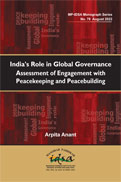India’s Role in Global Governance: Assessment of Engagement with Peacekeeping and Peacebuilding
- 2022 |
- Monograph
 An analysis of India in global governance showcases India as a versatile actor. Its role in the governance of different issue areas namely climate change, development assistance, trade and disarmament has been tempered by the nature of the regime in each case. As an actor in the governance of peacekeeping and peacebuilding, India has been active participant on various fronts and has made interventions on various issues in the global governance of peacekeeping and peacebuilding. It has shown the will to stay engaged with the many forums in the UN which deal with these issues over the years. It has gone out of its way to participate in the Security Council debates on peacekeeping and peacebuilding even while it is not serving a term on the Council. It is keenly aware of the normative, administrative and operational aspects of peacekeeping and peacebuilding. More importantly, it has demonstrated the way to work with the system to improve the governance of peacekeeping and peacebuilding.
An analysis of India in global governance showcases India as a versatile actor. Its role in the governance of different issue areas namely climate change, development assistance, trade and disarmament has been tempered by the nature of the regime in each case. As an actor in the governance of peacekeeping and peacebuilding, India has been active participant on various fronts and has made interventions on various issues in the global governance of peacekeeping and peacebuilding. It has shown the will to stay engaged with the many forums in the UN which deal with these issues over the years. It has gone out of its way to participate in the Security Council debates on peacekeeping and peacebuilding even while it is not serving a term on the Council. It is keenly aware of the normative, administrative and operational aspects of peacekeeping and peacebuilding. More importantly, it has demonstrated the way to work with the system to improve the governance of peacekeeping and peacebuilding.
About The Author
Dr. Arpita Anant is Associate Fellow at the Manohar Parrikar Institute for Defence Studies and Analyses (MP-IDSA), New Delhi. She holds a PhD in International Politics from Jawaharlal Nehru University. Her Ph.D thesis was entitled “Group Rights in the Indian and International Discourses”. She was awarded the ICSSR Doctoral Fellowship and the Commonwealth Visiting Fellowship (Canada) during 2001-02 to undertake doctoral research. Her current area of research is India’s multilateralism at the United Nations with particular focus on peacekeeping, counter-terrorism and sustainable development. Her wider areas of interest are global governance and India’s foreign policy. She is the editor of Non-State Armed Groups in South Asia: A Preliminary Structured Focused Comparison (New Delhi, Pentagon Security International, 2012) and author of Beyond Stereotypes: Contours of the Transition in Jammu and Kashmir (IDSA Monograph No. 16, April 2013) and Development and India’s Economic Multilateralism: Where From…Where to? (IDSA Monograph No.68, December 2020).
Attachment
Keywords: Global Governance, India





